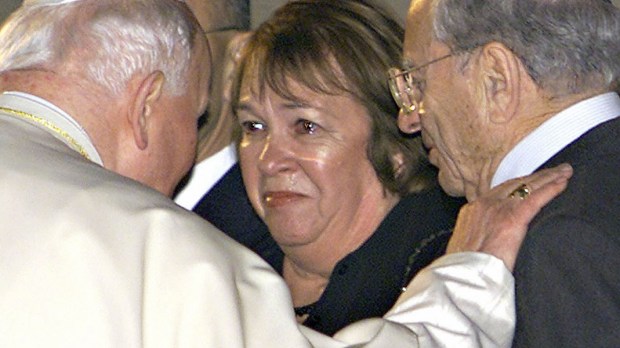It was January 1945. Thirteen-year-old Edith Zierer left the German labor camp in the town of Częstochowa. Little did she know that all her family members had been killed by the Germans. She could not walk. A young seminarian helped her at a railway station. That seminarian was Karol Wojtyla.
If not for him, she would have died of cold and hunger
After she left the camp, Edith got into a train car carrying coal. She ran out of strength. She got off at a train station in Jędrzejów (Świętokrzyskie Province). Totally exhausted, she fell to the ground. She was lying there, freezing and hungry, dressed only in a thin striped labor camp uniform infested with lice. Nobody looked in her direction and she could no longer move. Only one man stopped to help her.
As she later reminisced, he was handsome and energetic. He asked the girl what she was doing in a place like this. She replied that she was trying to get to Krakow. Tears filled her eyes when Karol Wojtyła asked what her name was. It had been a long time since anyone had called her by her first name. Until only recently, she had been but a number. He disappeared for a while, only to come back with hot tea, bread and cheese.
We should mention that during the Nazi German occupation Karol Wojtyla‚ a was preparing for the priesthood. Later as pope, recalling that difficult time of the war, John Paul II observed that his studies took place partly in the Solvay quarry in Krakow and during clandestine classes in the Palace of the Archbishops of Krakow.
On November 1, 1946, Karol Wojtyla‚ a was ordained to the priesthood by Cardinal Adam Sapieha.
He carried her in his arms and gave her his overcoat
“Try to get up,” the man encouraged her. Unfortunately, she couldn’t. She was so exhausted she sank to the ground. Seeing this, the seminarian took her in his arms and carried her for three kilometers to the station from where the train to Krakow was leaving.
The other Jews who were on the same train in the cattle car “warned her” that maybe the student priest would want to put her in the convent. Wojtyla covered Edith with a coat. The girl was very scared.
When the train stopped, she got off and hid behind the milk tanks. Wojtyla called her by the Polish version of her name: “Edyta, Edyta.” She kept his name in her memory forever.
The difficult wartime years
Edith was distrustful. Despite her young age, she had already gone through a lot in her life. She had moved from one place to another with her family. After the war broke out, she went with her loved ones to eastern Poland and then to Krakow. Her father had to live in hiding as his appearance was unmistakeably Semitic. Edith, on the other hand, did not look Jewish. She obtained forged documents and tried to live a normal life. One day she went out and never came back home. Arrested, together with her sister Judith she was transferred to the Jewish ghetto. There they noticed their father in one street. Unfortunately, before long the entire family was sent to the concentration camp in Płaszow. They were separated. Edith went by train in a different direction than the rest of her family. The train stopped in Skarżysko Kamienna, where all were divided into groups.
Zierer knew German well and was assigned to work in an ammunition factory. The hard work wore her down. She was starving and the Germans’ demands were growing.
In 1943 she was brought to the camp in Częstochowa. There, too, Jewish prisoners had to work in the munitions factory.
In 1945 the camp was liberated by the Russians. Edith wanted to find her loved ones. She was completely alone, although she did not know about it yet. Her parents had died in Dachau and her sister had been killed in Auschwitz. She was helped by the student priest Karol Wojtyła.
She remembered his name perfectly well. Throughout her life, she was grateful to him for rescuing her. They both had no family. The young priest had already lost his mother, father and brother. So had Edith. When in 1978 she heard that Wojtyła became pope, she was so overcome with joy that she cried out of this happiness. At that time she was living in Israel, having left Poland in 1951. She had her own family; she was a wife, a mother and worked as a dental technician. She wrote a letter to John Paul II and thanked him for saving her life.
Speak up, I am an old man
The pope remembered her and invited her to visit him at the Vatican. They met the first time after so many years in 1998. The Holy Father told her, “Speak up, child. I am an old man.” He blessed the woman and said: “Come back, my child.”
In 2000, during his pilgrimage to the Holy Land, John Paul II paid a visit to the Yad Vashem Institute and laid a flower wreath there. Addressing him, a woman said: “Who saves one life, saves the world entire.” This motto is emblazoned on the medal awarded to the Righteous Among the Nations, or those who saved the lives of the Jews during the Holocaust.
Edith would write to the pope and he replied. They did not meet again, though. Zierer passed away in 2014.

